|
Books Should Be Free Loyal Books Free Public Domain Audiobooks & eBook Downloads |
|
|
Books Should Be Free Loyal Books Free Public Domain Audiobooks & eBook Downloads |
|
Humorous Books |
|---|
|
Book type:
Sort by:
View by:
|
By: Richard Barnum | |
|---|---|
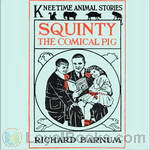 Squinty the Comical Pig
Squinty the Comical Pig
"This comical children's tale about the funny adventures of a funny pig written by an unknown author. The publisher has hired authors to write children's tales, and gave them "house names". The "name" of the author who wrote this tale is Richard Barnum. It became very successful, the most well known of Richard Barnum's tales. So, if you want to laugh a little, even if you are not a child, read this book". | |
By: Richard Brinsley Sheridan (1751-1816) | |
|---|---|
 School For Scandal
School For Scandal
Richard Brinsley Sheridan's comedy was first performed in 1777 and focuses on the intrigues and scandals of the British upper classes. Lady Sneerwell wants to marry Charles Surface, while Joseph Surface wants to marry Maria, an heiress and ward of Sir Peter Teazle. Maria, however, prefers Charles over Joseph. In order to detach her from Charles, Lady Sneerwell and Joseph spread rumors about an affair between Charles and Lady Teazle, Sir Peter's new young wife. Meanwhile, Sir Oliver Surface, newly returned from the East Indies, assumes various disguises to test his nephews' characters. Misunderstandings, mistaken identities, gossip, and bad behavior abound in this uproarious comedy. | |
By: Richard Harding Davis (1864-1916) | |
|---|---|
 The Make-Believe Man
The Make-Believe Man
Adventure was what our protagonist was looking for, when he boarded the steamer "Patience" for his holiday, and when one has a man with such a vivid imagination like Joseph Forbes Kinney as a travel companion, who seems to find adventures at every turn of the road (and if not, he manufactures them), the two travellers are sure to stumble into trouble... | |
 The Princess Aline
The Princess Aline
Morton Carlton, an easy-going, rich young artist, has never taken the concepts of love and marriage all that seriously -- until by accident a copy of an English illustrated paper falls into his hands, which contains a photograph of the young Princess Aline of Hohenwald. Instantly, Carlton is captivated by the princess, and decides that he must meet her. But how to get close to a princess, who lives in a small German duchy well protected by guards and etiquette? Carlton decides to travel to Europe and try his luck... | |
 My Buried Treasure
My Buried Treasure
"This is a true story of a search for buried treasure. The only part that is not true is the name of the man with whom I searched for the treasure. Unless I keep his name out of it he will not let me write the story, and, as it was his expedition and as my share of the treasure is only what I can make by writing the story, I must write as he dictates. I think the story should be told, because our experience was unique, and might be of benefit to others. And, besides, I need the money." (From the text) | |
By: Richard Marsh (1857-1915) | |
|---|---|
 Amusement Only
Amusement Only
This is a collection of 12 short stories of mystery and humor, which are, as the title says, for amusement only. | |
By: Richmal Crompton (1890-1969) | |
|---|---|
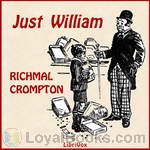 Just William
Just William
William is a mischievous eleven year old who is puzzled by the adult world, which is no less puzzled by him. The humor is gentle and pleasing. The series of books is better known in the United Kingdom than in the U.S. ( | |
 Still - William
Still - William
More humorous adventures by the world’s most misunderstood English boy. - Summary by david wales | |
 William -- The Fourth
William -- The Fourth
The world’s most confident, most chaos-creating eleven year old boy is at it again in these fourteen glorious and funny 1924 short stories. - Summary by David Wales | |
By: Ring Lardner (1885-1933) | |
|---|---|
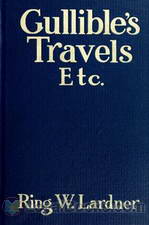 Gullible's Travels, Etc.
Gullible's Travels, Etc.
Humorous stories of social climbing in America's "classless" society. | |
By: Robert Barr (1850-1912) | |
|---|---|
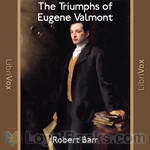 The Triumphs of Eugene Valmont
The Triumphs of Eugene Valmont
Short stories by a colleague of Jerome K. Jerome, and friend of Sir Arthur Conan Doyle. Barr probably wrote the first parody of Sherlock Holmes (included in this collection). He co-edited “The Idler” with Jerome. [written by Czechchris] | |
 In a Steamer Chair and Other Stories
In a Steamer Chair and Other Stories
Thirteen short stories by one of the most famous writers in his day. Robert Barr was a British Canadian short story writer and novelist, born in Glasgow, Scotland. In London of the 1890s Barr became a more prolific author - publishing a book a year - and was familiar with many of the best selling authors of his day, including Bret Harte and Stephen Crane. Most of his literary output was of the crime genre, then quite in vogue. When Arthur Conan Doyle's Sherlock Holmes stories were becoming well known,... | |
By: Robert Benchley (1889-1945) | |
|---|---|
 Love Conquers All
Love Conquers All
Sixty-three essays on a variety of topics as wide apart as Family Life in America, Opera Synopses, Bigamy, International Finance and many more, Love Conquers All by Robert Benchley strangely enough does not touch upon romance at all! However, these delightful notes provide hours of browsing pleasure for young and old readers alike. Robert Benchley was a well-known humorist and newspaper columnist, radio and television presenter, actor, scriptwriter and broadcaster. He is also credited with creating the first ever television entertainment show and one of his iconic short films, How to Sleep won an Academy Award in 1936... | |
By: Robert C. Benchley (1889-1945) | |
|---|---|
 Of All Things
Of All Things
A collection of amusing essays satirizing serious consideration of topics including natural history, social etiquette, or indeed, civilized behavior (especially of the upper classes). | |
By: Robert Copland (fl. 1515) | |
|---|---|
 Jyl of Breyntfords Testament
Jyl of Breyntfords Testament
Introduction - This is a collection of ten comic pieces from the 16th century and earlier, as compiled and edited by Frederick Furnivall for private circulation in 1871. Only the first is by Copland. (Introduction by Grant Hurlock) | |
By: Robert Henry Newell (1836-1901) | |
|---|---|
 The Orpheus C. Kerr Papers
The Orpheus C. Kerr Papers
These are a collection of humorous "letters" written by a fictional character to a relation in the north during the Civil War. They were published regularly in the New York Mercury Sunday newspaper for the four years of the war. In the letters, Newell pokes fun at northern generals, politicians, and has hard things to say about southerners. Although Newell is rarely serious, I imagine the letters reflect the bitterness and frustration of many northerners at the time. (Introduction by Margaret) | |
By: Robert J. Burdette (1844-1914) | |
|---|---|
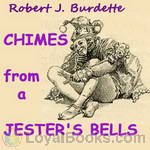 Chimes From A Jester’s Bells
Chimes From A Jester’s Bells
Part I. The Story of Rollo; Mr. Holliday knows all there is to know about raising children, or at least he thinks he does. His attempts to train his son, Rollo, "in the way he should go," are well-meant, but hilariously unsuccessful--or are they? I believe this is a sort of spoof of the “Rollo” series for children, that was written by Jacob Abbot in the mid 19th century. The characters have the same names and the chapters have a little Q&A at the end like the Abbot books, except these are definitely tongue-in-cheek... | |
By: Robert Jones Burdette (1844-1914) | |
|---|---|
 Chimes From A Jester’s Bells
Chimes From A Jester’s Bells
Part I. The Story of Rollo; Mr. Holliday knows all there is to know about raising children, or at least he thinks he does. His attempts to train his son, Rollo, "in the way he should go," are well-meant, but hilariously unsuccessful--or are they? I believe this is a sort of spoof of the “Rollo” series for children, that was written by Jacob Abbot in the mid 19th century. The characters have the same names and the chapters have a little Q&A at the end like the Abbot books, except these are definitely tongue-in-cheek... | |
By: Robert Louis Stevenson | |
|---|---|
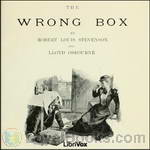 The Wrong Box
The Wrong Box
The Wrong Box is a comedy about the ending of a tontine (a tontine is an arrangement whereby a number of young people subscribe to a fund which is then closed and invested until all but one of the subscribers have died. That last subscriber then receives the whole of the proceeds). The story involves the last two such survivors and their relations, a train crash, missing uncles, surplus dead bodies and innocent bystanders. A farce really. | |
By: Robert Pitcher Woodward (1866-) | |
|---|---|
 On A Donkey's Hurricane Deck
On A Donkey's Hurricane Deck
" A Tempestous Voyage of Four Thousand and Ninety-Six Miles Across the American Continent on a Burro, in 340 Days and 2 Hours - starting without a dollar and earning my way." The journey could be accomplished in 5 days by train, but the author took close to a year to work his way across the country. This is a witty and amusing account of one man (and his donkey)'s adventures crossing the American continent from New York to San Francisco. | |
By: Robert Williams Wood (1868-1955) | |
|---|---|
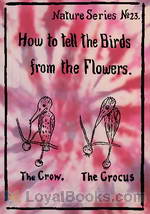 How to Tell the Birds from the Flowers
How to Tell the Birds from the Flowers
How do you tell apart a parrot from a carrot? A plover from a clover? A bay from a jay? Although there are several ways of differentiating, R. W. Wood’s use of pun and rhyme is one of the most entertaining! | |
By: Rudolf Erich Raspe (1737-1794) | |
|---|---|
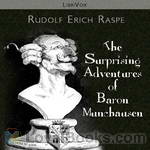 The Surprising Adventures of Baron Munchausen
The Surprising Adventures of Baron Munchausen
The stories about Münchhausen were first collected and published by an anonymous author in 1781. An English version was published in London in 1785, by Rudolf Erich Raspe, as Baron Munchhausen's Narrative of his Marvellous Travels and Campaigns in Russia, also called The Surprising Adventures of Baron Munchhausen. It is not clear how much of the story material derives from the Baron himself; however, it is known that the majority of the stories are based on folktales that have been in circulation for many centuries before Münchhausen's birth. | |
By: Rudyard Kipling (1868-1936) | |
|---|---|
 Letters of Travel
Letters of Travel
| |
By: Rupert Hughes (1872-1956) | |
|---|---|
 Excuse Me! (Dramatic Reading)
Excuse Me! (Dramatic Reading)
What happens when a mix of lovers get stuck together on a coast-to-coast train? Mainly hilarity. There is every kind of couple imaginable. One serviceman and his bride-to-be are trying desperately to get married but can't find a clergyman to perform the rites. They don't know that right in their midst is a preacher disguised as a man of the world so he and his wife can enjoy a carefree vacation. Then there is a drunk mourning his separation from the wife who just happens to be on the same train. There is even a confirmed bachelor who discovers that a confirmed spinster is his long-lost love from years ago... | |
By: S. Baring-Gould (1834-1924) | |
|---|---|
 Pennycomequicks
Pennycomequicks
The Pennycomequicks is the charming and witty story of a dysfunctional English family in the late 19th century, scattered to the winds, scarred and battered by human and Divine tragedy, struggling for sustenance of the material and / or immaterial kind. | |
By: Saki (1870-1916) | |
|---|---|
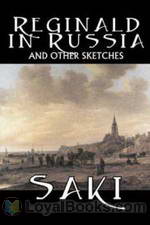 Reginald
Reginald
Saki was the pen name of the British author Hector Hugh Munro (1870 – 1916). His witty, biting and occasionally odd short stories satirised Edwardian culture. Saki is considered a master of the short story and has been compared to O. Henry and Dorothy Parker as well as Noel Coward and Oscar Wilde (who clearly influenced Saki). His first collection of short stories, Reginald, was published by Methuen Press in 1904 though these stories first appeared in the ‘Westminster Gazette’. The stories... | |
 The Chronicles of Clovis
The Chronicles of Clovis
This is the third collection of short stories by Saki, following on from “Reginald” and “Reginald in Russia”. Although some of the stories have characters that do not appear elsewhere in the collection, many of them are loosely centred round the young Clovis Sangrail (effectively a reincarnation of Reginald). | |
 Beasts and Super-Beasts
Beasts and Super-Beasts
Saki (December 18, 1870 – November 14, 1916) was the pen name of British author Hector Hugh Munro. Saki’s world contrasts the effete conventions and hypocrisies of Edwardian England with the ruthless but straightforward life-and-death struggles of nature. Nature generally wins in the end. | |
 The Toys of Peace
The Toys of Peace
This is the fifth collection of short stories by Saki (H.H. Munro), and was published posthumously in 1923. Even so, many of the stories are quite up to the standard of those collected earlier. | |
By: Sara Ware Bassett (1872-1968) | |
|---|---|
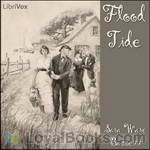 Flood Tide
Flood Tide
Willie Spence may have been a bit eccentric by most standards, but he had a knack for creating gadgets in his small workshop at his home on Cape Cod. Whenever he was 'ketched' by an 'idee' he had to see it to completion, and always did. His small cottage on the Cape had become a labyrinth of string and wires tacked here and there so as to make life a bit challenging for his housekeeper Celestina. But she and most everyone else among the coastal towns and villages loved the old man for all his eccentricities as Willie spent his waning years just waiting for his ship to come in. | |
By: Sinclair Lewis (1885-1951) | |
|---|---|
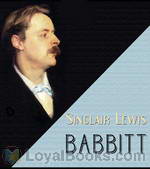 Babbitt
Babbitt
| |
By: Sir Arthur Conan Doyle (1859-1930) | |
|---|---|
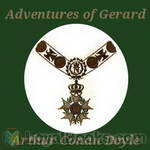 The Adventures of Gerard
The Adventures of Gerard
These lesser known stories were penned by Conan Doyle during the period between killing off Sherlock Holmes in 1893 and reluctantly resurrecting him some ten years later. The swashbuckling, eponymous hero, Etienne Gerard, is one of Napoleon's gallant French Hussars, who considers himself the finest of them all. Through these "Boys Own Adventures", Conan Doyle pokes gentle fun at both the French and the English. This is the second volume containing eight adventures. | |
By: St. John Emile Clavering Hankin (1869-1909) | |
|---|---|
 Mr. Punch's Dramatic Sequels
Mr. Punch's Dramatic Sequels
A collection of short and humorous one-act "sequels" to 14 major plays (many already in the catalog). Plays end too soon. They never show the whole of what I want to know. The curtain falls and I'm perplexed with doubts about what happened next. Did HAMLET'S father haunt no more the battlements of Elsinore? Does LADY TEAZLE never call at LADY SNEERWELL'S now at all? Was BENEDICK'S a happy marriage? And will the MELNOTTES keep a carriage? Will AUBREY take to wife one day another MRS. TANQUERAY? Do ECCLES and his stepson wrangle? Has anything been heard of DANGLE? What has become of MRS... | |
By: Steele Rudd (1868-1935) | |
|---|---|
 On Our Selection
On Our Selection
The humorous account of Dad and Dave and the rest of the Rudd clan as they attempt to carve a farming 'selection' out of the Australian wilderness in spite of fire, famine, snakebite, and a loony hired hand. | |
 Dad's Trip to Brisbane (from Our New Selection)
Dad's Trip to Brisbane (from Our New Selection)
Chapters XV through XIX of "Our New Selection" "The wheat was in, and Dad decided to take a trip to Brisbane. For seven or eight years he had been thinking of that trip, but something or other always came to prevent his going. According to Dad himself, the farm would suffer if he went away for a month; there would be no one to look after it, no one to manage. According to us there would be no one to look on while the cows were being milked; no one to stand in the paddock all day while the hay was... | |
 Dave Brings Home A Wife (dramatic reading)
Dave Brings Home A Wife (dramatic reading)
This is a self-contained story-arc over eight chapters from the pages of Steele Rudd's book "Back At Our Selection". The Synopsis: After being a shy bachelor for a number of years, Dave has finally got married. To a "Girl from Town" named "Lily White". When she first arrives at "Ruddville", she and Dave's sister Sarah get on wonderfully. But after some months, friction between the two young woman sets in, and Dave and Lily seek to have a separate house of their own on the extensive Rudd property... | |
By: Stephen Leacock (1869-1944) | |
|---|---|
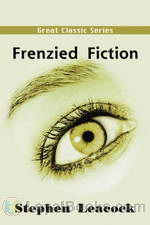 Frenzied Fiction
Frenzied Fiction
From the cave man to Santa Claus; spies, know-it-alls, and journalists: all are fair game for Leacock’s special brand of humor. He touches on the changes time has brought about in the city, education, and work habits. Among the other topics in this work are nature, fishing, gardening, success, and spirits–both of the departed and of the variety Prohibition prohibited. Each chapter of this book is a standalone story and if you love a good laugh, these stories are for you. In me, Leacock’s wit produced the full range of laughter: smiles, chuckles, guffaws, and some uncontrollable giggles. Also, occasionally, I found myself shedding a tear or two. (Review by Debra Lynn) | |
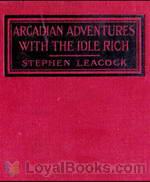 Arcadian Adventures with the Idle Rich
Arcadian Adventures with the Idle Rich
“Arcadian Adventures with the Idle Rich” is a work of humorous fiction by Stephen Leacock first published in 1914. It is the follow-up to his 1912 classic “Sunshine Sketches of a Little Town.” Like that work, it is a sequence of interlocking stories set in one town, but instead of focusing on a small Canadian town in the countryside, it is set in a major American metropolis and its characters are the upper crust of society. Although currently not as well-known as the earlier book, “Arcadian Adventures” was extremely popular in North America at the time of its publication and for a while was considered the greater success... | |
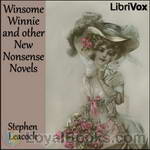 Winsome Winnie and other New Nonsense Novels
Winsome Winnie and other New Nonsense Novels
Eight silly stories by Canadian humourist Stephen Leacock. | |
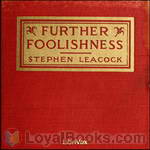 Further Foolishness
Further Foolishness
Seventeen goofy stories and essays by Canadian humourist Stephen Leacock. "Professor Leacock has made more people laugh with the written word than any other living author. One may say he is one of the greatest jesters, the greatest humorist of the age." – A. P. Herbert (Introduction by TriciaG & Wikipedia) | |
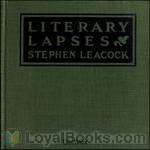 Literary Lapses
Literary Lapses
Short sketches relating the humourous side of life in 1910. "Professor Leacock has made more people laugh with the written word than any other living author. One may say he is one of the greatest jesters, the greatest humorist of the age." – A. P. Herbert | |
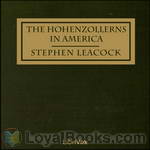 The Hohenzollerns in America
The Hohenzollerns in America
More stories by Canadian Stephen Leacock. Some of these stories carry over characters introduced in Further Foolishness. Some stories are humourous; some are more thoughtful. It helps to be familiar with WWI-era European politics to catch much of the humour. Full title: The Hohenzollerns in America With the Bolsheviks in Berlin and Other Impossibilities | |
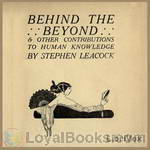 Behind the Beyond
Behind the Beyond
A collection containing a parody on Problem Plays, as well as humorous anecdotes from Canadian humourist Stephen Leacock. | |
 Moonbeams from the Larger Lunacy
Moonbeams from the Larger Lunacy
Humorous, ironic, and sometimes cynical observations of life in 1915 from Canadian humourist Stephen Leacock. | |
 My Discovery of England
My Discovery of England
"In the course of time a very considerable public feeling was aroused in the United States and Canada over this state of affairs. The lack of reciprocity in it seemed unfair. It was felt (or at least I felt) that the time had come when some one ought to go over and take some impressions off England. The choice of such a person (my choice) fell upon myself. By an arrangement with the Geographical Society of America, acting in conjunction with the Royal Geographical Society of England (to both of whom I communicated my proposal), I went at my own expense."And from thence follow the impressions of Canadian political economist and humourist, Stephen Leacock, after a lecturing visit to England. | |
 Essays and Literary Studies
Essays and Literary Studies
A collection of wry looks at literature, education, and other social phenomena by Canadian humourist and economics professor, Stephen Leacock. | |
 Garden Of Folly
Garden Of Folly
A 1924 collection of essays by the celebrated Canadian humorist, popular in the first half of the twentieth century throughout the English speaking world. - Summary by david wales | |
By: Stuart Mason (1872-1927) | |
|---|---|
 Oscar Wilde Calendar
Oscar Wilde Calendar
A compendium of Oscar Wilde's wit, including some of his most famous epigrams as well as unpublished quotations supplied by his friends. The book is formatted as a calendar, with one saying for each day of the year, and was edited by Wildean scholar, Stuart Mason . - Summary by Rob Marland | |
By: Susan Edmonstoune Ferrier | |
|---|---|
 Marriage, Volume 1
Marriage, Volume 1
“Love!–A word by superstition thought a God; by use turned to an humour; by self-will made a flattering madness.” – Alexander and Campaspe. Lady Juliana, the indulged and coddled seventeen (”And a half, papa”) year old daughter of the Earl of Cortland, is betrothed by her father to a wealthy old Duke who can give her every luxury. She instead runs away and marries her very handsome but penniless lover. Very soon, they are forced to travel to Scotland to live with his quirky family in a rundown “castle” in the barren wilderness. Can this marriage survive?(Summary by P.Cunningham) | |
By: T. W. H. Crosland | |
|---|---|
 Egregious English
Egregious English
This 1903 book is a tongue-in-cheek send-up of English people and subjects. Within the humor , the listener may be surprised by some diamond-hard observations. The listener is also alerted to some attitudes of a different time that would not be acceptable in today's polite discourse. Here writing as “Angus McNeil”, a Scotsman, Crosland was a British author, poet, and journalist . | |
By: Thomas A. Janvier (1849-1913) | |
|---|---|
 Uncle Of An Angel
Uncle Of An Angel
In what I have read so far this book appears to be a humorous character study on two levels. That between the uncle and niece and that of polite society in the 19th century. Anything can happen. I for one want to find out what will happen!! | |
By: Thomas Hardy (1840-1928) | |
|---|---|
 The Hand of Ethelberta
The Hand of Ethelberta
Ethelberta was raised in humble circumstances but became a governess and consequently, at the age of 18, married well. However, her husband died two weeks after the wedding. Her father-in-law, Lord Petherwin, died shortly afterwards. Ethelberta (now 21) lives with her mother-in-law, Lady Petherwin. In the three years that have elapsed since her marriage, Ethelberta has been treated to foreign travel and further privileges by Lady Petherwin but restricted from seeing her own family. The story follows Ethelberta's career as a famous poetess and storyteller... | |
By: Thomas Hood (1799-1845) | |
|---|---|
 Workhouse Clock
Workhouse Clock
There were scarcely any events in the life of Thomas Hood. One condition there was of too potent determining importance—life-long ill health; and one circumstance of moment—a commercial failure, and consequent expatriation. Beyond this, little presents itself for record in the outward facts of this upright and beneficial career, bright with genius and coruscating with wit, dark with the lengthening and deepening shadow of death. | |
By: Thomas Love Peacock | |
|---|---|
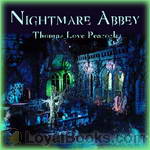 Nightmare Abbey
Nightmare Abbey
Deep in the fens of the British coast sits the gloomy mansion that goes by the name Nightmare Abbey. It is inhabited by persons of very low opinion of the human race, and in fact they pride themselves in the depths of their detestation. Others of its denizens believe the ultimate exercise and product of the human mind ought to be chaos. Now let the young master of the house get snared by the wiles of a beautiful young lady. And for good measure, toss in another beautiful young lady. Now Scythrop... | |
By: Thornton W. Burgess (1874-1965) | |
|---|---|
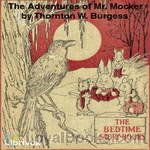 The Adventures of Mr. Mocker
The Adventures of Mr. Mocker
When an innocent blue jay starts talking in his sleep, it’s up to him to find out what’s going on in this fun, naturalistic, Southern-style children’s story. | |
By: Timothy S. Arthur (1809-1885) | |
|---|---|
 Off-hand Sketches
Off-hand Sketches
The reader cannot but smile at some of the phases of life presented in this volume. Yet the smile will, in no case, the author thinks, be at the expense of humanity, good feeling, or virtue. Many of the incidents given, are facts embellished by a few touches of fancy. In all, lessons may be read that some, at least, will do well to lay to heart. | |
By: Tobias Smollett | |
|---|---|
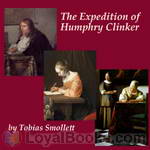 The Expedition of Humphry Clinker
The Expedition of Humphry Clinker
The Expedition of Humphry Clinker was the last of the picaresque novels of Tobias Smollett, and is considered by many to be his best and funniest work. Published in London on 17 June 1771, it is an epistolary novel, presented in the form of letters written by six different characters: Matthew Bramble, a Welsh Squire; his sister Tabitha; their niece and nephew, Jery and Lydia Melford; Tabitha’s maid Winifred Jenkins; and Lydia’s suitor, Wilson. Much of the comedy arises from differences in the descriptions of the same events by different participants... | |
By: Unknown | |
|---|---|
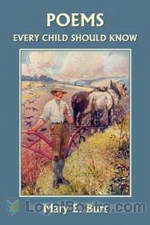 Poems Every Child Should Know
Poems Every Child Should Know
A treasure trove of more than two hundred poems, this gem of an anthology compiled by Mary E Burt is indeed a most valuable set of poems to read or listen to. Published in 1904, Poems Every Child Should Know contains some well-loved verses like Thomas Gray's Elegy Written in a Country Churchyard, Lewis Carroll's delightful parody Father William, Felicia Hemans' deeply-moving Casablanca and other favorites. It also has lesser-known but equally beautiful pieces like Henry Wadsworth Longfellow's The Arrow and The Song, Robert Browning's The Incident of the French Camp, Eugene Field's nonsense lyrics Wynken, Blynken and Nod and a host of other wonderful verses... | |
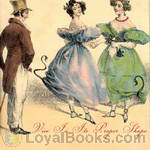 Vice in its Proper Shape
Vice in its Proper Shape
Cautionary tales of the transmigration of the souls of naughty boys and girls, as elucidated by the mysterious Bramin, Mr Wiseman: “Having been gifted with the faculty of distinguishing those animals which are now animated by the souls of such human beings as formerly degraded themselves to a level with the unthinking brutes, I have taken the pains to provide a collection of beasts, birds, &c. most of which are inhabited by the souls of some naughty masters or misses, who died in the neighbourhood.” (David Barnes, quoting the Introduction) | |
 Humour of the North
Humour of the North
Some day an enterprising editor may find time to glean from the whole field of Canadian literature a representative collection of wit and humour. . . . The present little collection obviously makes no such ambitious claim. It embraces, however, what are believed to be representative examples of the work of some of our better-known writers, many of which will no doubt be quite familiar to Canadian readers, but perhaps none the less welcome on that account. | |